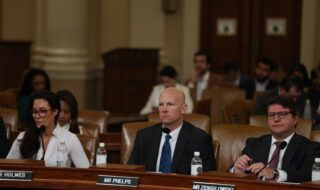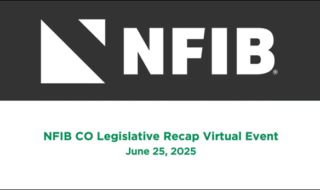April 6, 2021
NFIB to Oppose State Muscling into Health Insurance Market
DENVER, April 6, 2021—The voice of Colorado small business will testify against House Bill 1232 when it comes up for a hearing tomorrow, Wednesday, April 7, at 1:30 p.m., in Room 0112, in the State Capitol.
“House Bill 1232 sets up a non-profit entity to offer health insurance coverage should carriers not meet premium reduction goals set out in the bill,” said Tony Gagliardi, Colorado state director for the National Federation of Independent Business (NFIB). “As a non-profit entity, there is no incentive for the Colorado Option to earn a profit, therefore becoming a massive taxpayer-funded public health insurance plan and driving the private insurance market out of Colorado.”
“HB 1232 is not designed to compete with private insurance plans. It is designed to force as many Colorado health insurance carriers as possible out of Colorado, forcing families and small businesses into a new government-run health insurance system. Private insurance will pick up the cost-shifting forcing higher premiums. Because of required rate adjustments outlined in the bill private carriers would reach a point when the ability to compete with HB 1232 is near to impossible. We can discuss premiums all day long, but the question is why we are not discussing what drives those premiums.”
Gagliardi listed nine cost-drivers that make health insurance premiums more expensive and which the Colorado Legislature would better spend its time on as:
1. Physician, facility, and drug costs. Data from the Organization for Economic Cooperation and Development have consistently showed the average unit costs for U.S. physicians, hospitals, facilities, and drugs the highest in the world.
2. Expensive technologies and procedures. When Americans do receive treatment, they often choose the most expensive technologies and procedures. For example, MRIs in the United States occur twice as often compared with the average country in OECD data. (Summit County, four times that of the Front Range, high rate of multiple diagnostics for the same patient)
3. Fragmented and uncoordinated care. Because care providers often treat the same patient with little consultation, unnecessary care, errors, and dissatisfaction proliferate.
4. Lack of cost consideration from patients. There is an assumption among patients that the most expensive care leads to the best quality, but expensive care has no correlation with quality. Patients have limited capabilities to participate in the cost decision making process of their care.
5. Fee-for-service. Hospitals and physicians are reimbursed for every service they provide, which often leads to a focus on volumes instead of a focus on care.
6. High administrative expenses. The morass of health insurers and billing processes cost the U.S. health care system billions in wasted costs every year.
7. Unhealthy behaviors. Chronic illnesses — like heart disease, cancer, and diabetes — cause about 70 percent of all deaths in the United States, and they are the most expensive to treat. Most chronic illnesses stem from unhealthy behaviors.
8. Expensive end-of-life care. The last year of an American’s life is the most expensive for medical treatment, and the unnecessary procedures and repeated hospitalizations provide little value to the patient and the system at large.
9. Provider consolidation. Hospitals and health systems are merging and acquiring each other at a feverish pace, and the same goes for physician groups. Studies have shown that although provider consolidation leads to some economies of scale, the increased market power leads to higher prices and oligopolistic behaviors.
Anyone wishing to testify live, by uploading written testimony, or by typing into a dialog box can do so at this link.
Related News Release
March 30—Public Health-Care Option Avoids Finding Real Solutions
Contact: Tony Gagliardi, Colorado State Director, tony.gagliardi@nfib.org,
or Tony Malandra, Senior Media Manager, anthony.malandra@nfib.org
Keep up with the latest Colorado small-business news at www.nfib.com/colorado or by following NFIB on Twitter @NFIB_CO or on Facebook @NFIB.CO
###
For 78 years, NFIB has been advocating on behalf of America’s small and independent business owners, both in Washington, D.C., and in all 50 state capitals. NFIB is a nonprofit, nonpartisan, and member-driven association. Since its founding in 1943, NFIB has been exclusively dedicated to small and independent businesses and remains so today. For more information, please visit nfib.com.
NFIB Colorado
1700 Lincoln Street, 17th Floor
Denver, CO 80203
303-860-1778
www.nfib.com/colorado
Twitter: @NFIB_CO
Facebook: NFIB.CO
NFIB is a member-driven organization advocating on behalf of small and independent businesses nationwide.
Related Articles















